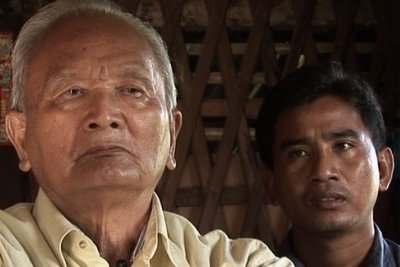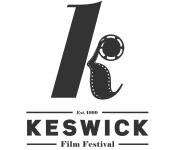Reviews - Enemies Of The People
Enemies Of The People
Reviewed By John Stakes

Enemies Of The People
The atrocities committed by the Khmer Rouge in Cambodia during the final quarter of the twentieth century rank amongst the worst since WW2. Almost two million people were butchered between 1975 and 1979 alone.
The dead included the father and brother of Thet Sambath, director and co-producer of last Sunday’s extraordinary documentary. These people met their end in what have become known as “the killing fields” (also the title of Roland Joffé’s celebrated 1984 film on this subject), but this is the first and may probably be the last time any attempt has been made to get into the mindset of those responsible. Until this point these crimes had never been investigated and a wall of silence had prevailed largely because the perpetrators understandably did not wish to open up and, for many years, the activities of the Khmer Rouge did not figure in Cambodian school curricula.
Sambath spent over ten years painstakingly gaining the trust of Pol Pot’s “Number Two Brother” Nuon Chea in the hope he would talk openly for the first time. Pol Pot had died in 1998 when the regime finally collapsed and Chea had denied any involvement when interviewed by the BBC in 2002
Sambath was well qualified to undertake this task not merely because of his personal loss but he had spent many years as a reporter with the Phnom Penh Post, Cambodia’s premier English language newspaper gaining an enviable reputation as an investigative journalist. He was also a paramedic, a police interpreter and a human rights investigator. Since 1994 he has also been a translator and camera operator for several world-wide broadcasting organisations including the BBC and NBC.
His co-producer for this film was Rob Lemkin the founder of Old Street Films and responsible for over fifty documentaries for the BBC, Channel 4, ITV and Sky. The crucial test for any documentary is whether it is truthful. However careful its makers may be in preparing to capture the truth on camera there is always the danger that those interviewed may play up to the camera and distortion may occur in the editing process.
Their film amounts to a series of confessions. Chea, now an elderly grandfather, breaks his thirty years’ silence to explain how he and Pol Pot decided as they put it, to kill party members whom they considered enemies of the people and in the pay of the Vietnamese or the Americans. Chea appeared quite jovial and had no qualms about the killings, but on camera it was never put to him the enormity of the killing spree.
As the interview process continued Sambath learned that Chea will shortly be arrested and decided to tell him that his father and brother had not died naturally as he’d previously said but had been killed. Strangely, considering that Sambath’s main purpose was to learn why and not how his family were killed, he did not ask Chea to explain. Chea’s response is merely to apologise. Research reveals that the Khmer Rouge mobilised the agrarian and largely uneducated community to kill a whole range of people including property owners, professional and intellectuals: anyone in fact who had not been part of the uprising. Chea is likely to face trial in 2011 and clearly approached his future with equanimity feeling that although the regime had made mistakes, he’d done nothing wrong. Sounds familiar?
Sambath also interviewed local farm-workers Khoun and Suon who had taken orders from “Sister Em” to butcher the local population. They seemed genuinely relieved to confess some involvement (but not its magnitude) but, as they were merely obeying orders (refusal of which would probably have meant their own deaths) Buddha would forgive. In turn Sambath felt that until he secured these confessions his country could not become reconciled to its past and move on.
Sambath’s motive was not to seek revenge but to create a work which could later be relied upon as an historical record. It certainly came across as an honest and impartial documentary and entirely in accordance with Sambath’s journalistic credentials. It was made on a shoestring with Sambath often having to make a choice between spending his limited resources on feeding his family properly or funding his film. “Enemies of the People” has gone on to receive the award for best documentary
at the 2010 BIFA awards and won the special jury prize at the 2010 Sundance Film Festival. This powerful film will long remain in the memory.
The dead included the father and brother of Thet Sambath, director and co-producer of last Sunday’s extraordinary documentary. These people met their end in what have become known as “the killing fields” (also the title of Roland Joffé’s celebrated 1984 film on this subject), but this is the first and may probably be the last time any attempt has been made to get into the mindset of those responsible. Until this point these crimes had never been investigated and a wall of silence had prevailed largely because the perpetrators understandably did not wish to open up and, for many years, the activities of the Khmer Rouge did not figure in Cambodian school curricula.
Sambath spent over ten years painstakingly gaining the trust of Pol Pot’s “Number Two Brother” Nuon Chea in the hope he would talk openly for the first time. Pol Pot had died in 1998 when the regime finally collapsed and Chea had denied any involvement when interviewed by the BBC in 2002
Sambath was well qualified to undertake this task not merely because of his personal loss but he had spent many years as a reporter with the Phnom Penh Post, Cambodia’s premier English language newspaper gaining an enviable reputation as an investigative journalist. He was also a paramedic, a police interpreter and a human rights investigator. Since 1994 he has also been a translator and camera operator for several world-wide broadcasting organisations including the BBC and NBC.
His co-producer for this film was Rob Lemkin the founder of Old Street Films and responsible for over fifty documentaries for the BBC, Channel 4, ITV and Sky. The crucial test for any documentary is whether it is truthful. However careful its makers may be in preparing to capture the truth on camera there is always the danger that those interviewed may play up to the camera and distortion may occur in the editing process.
Their film amounts to a series of confessions. Chea, now an elderly grandfather, breaks his thirty years’ silence to explain how he and Pol Pot decided as they put it, to kill party members whom they considered enemies of the people and in the pay of the Vietnamese or the Americans. Chea appeared quite jovial and had no qualms about the killings, but on camera it was never put to him the enormity of the killing spree.
As the interview process continued Sambath learned that Chea will shortly be arrested and decided to tell him that his father and brother had not died naturally as he’d previously said but had been killed. Strangely, considering that Sambath’s main purpose was to learn why and not how his family were killed, he did not ask Chea to explain. Chea’s response is merely to apologise. Research reveals that the Khmer Rouge mobilised the agrarian and largely uneducated community to kill a whole range of people including property owners, professional and intellectuals: anyone in fact who had not been part of the uprising. Chea is likely to face trial in 2011 and clearly approached his future with equanimity feeling that although the regime had made mistakes, he’d done nothing wrong. Sounds familiar?
Sambath also interviewed local farm-workers Khoun and Suon who had taken orders from “Sister Em” to butcher the local population. They seemed genuinely relieved to confess some involvement (but not its magnitude) but, as they were merely obeying orders (refusal of which would probably have meant their own deaths) Buddha would forgive. In turn Sambath felt that until he secured these confessions his country could not become reconciled to its past and move on.
Sambath’s motive was not to seek revenge but to create a work which could later be relied upon as an historical record. It certainly came across as an honest and impartial documentary and entirely in accordance with Sambath’s journalistic credentials. It was made on a shoestring with Sambath often having to make a choice between spending his limited resources on feeding his family properly or funding his film. “Enemies of the People” has gone on to receive the award for best documentary
at the 2010 BIFA awards and won the special jury prize at the 2010 Sundance Film Festival. This powerful film will long remain in the memory.
Find A Film
Search over 1500 films in the Keswick Film Club archive.
Friends
KFC is friends with Caldbeck Area Film Society and Brampton Film Club and members share benefits across all organisations
Awards
Keswick Film Club won the Best New Film Society at the British Federation Of Film Societies awards in 2000.
Since then, the club has won Film Society Of The Year and awards for Best Programme four times and Best Website twice.
We have also received numerous Distinctions and Commendations in categories including marketing, programming and website.
 Talking Pictures
The KFC Newsletter
Talking Pictures
The KFC Newsletter
Links Explore the internet with Keswick Film Club


